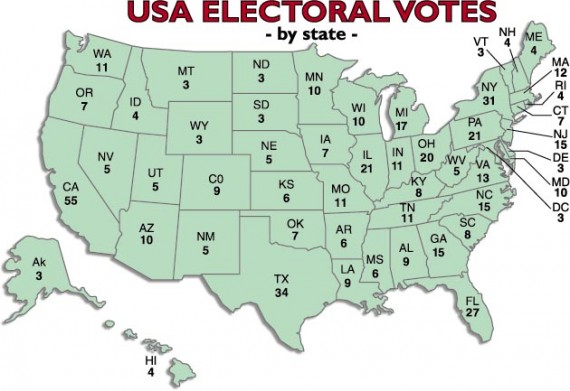Romney and Obama Work for Every Vote, Especially in Small States (Oh, Wait…)
No, the electoral college does not encourage the candidates to pay special attention to the small states.
 Whenever I post on the flaws of the electoral college (such as I did recently here and here), one of the attempted counter-arguments is often that the electoral college forces the candidates to pay attention to the small states and that this is something that they would not do if we elected the president via a national popular vote.
Whenever I post on the flaws of the electoral college (such as I did recently here and here), one of the attempted counter-arguments is often that the electoral college forces the candidates to pay attention to the small states and that this is something that they would not do if we elected the president via a national popular vote.
This sounds good, I suppose, as we are usually taught in basic civics class that the reason we have the EC in the first place is to make sure that the small states were not ignored. And since we are taught that this was the intention of the Framers, we often do a good job of ex post facto reasoning to make all the pieces fit together.
However, if we look at where the attention is going, it is not to small states, it is to swing states. For example, see the NYT: Cash Flood Fuels Fight to the End in Leaning States (not that one really needs a news piece to draw attention to where the candidates are focusing their money and energies at the moment).
The only “small state” (as defined by population) that is truly of significance at the moment is New Hampshire and its four electoral votes. It is not its size that makes NH relevant to the campaigns, but rather it is their swing state status.
Consider the following smallest of “small states” (i.e., those with three electoral votes): Alaska, Montana, Wyoming, North Dakota, South Dakota, Vermont, and Delaware. None of these are of consequence at the moment because they are not swing states. Or, consider, those with four EVs: Hawaii, Idaho, Maine, New Hampshire, and Rhode Island. As noted, the only one of those of potential significance at the moment is NH.
So, let’s not pretend that the electoral college enhances the attention that small states receive. All it does is make swing states (regardless of population size) significant every four years and treats the rest of the country as decided.
Look back, for example, on where commercials were aired in 2008 (click): note the focus was not on where voters were, but on where swing voters were.
And, by the way, the notion that the small states see the electoral college as being so in their advantage that they would never accept reforming it, it is worth noting that several small state have passed legislation in support of the national popular vote initiative that would result in states casting their electoral votes for the candidate who won the national vote. It is law in Hawaii and Vermont and it has passed both houses in Rhode Island. It has passed one house in Delaware. This would indicate that the small states do not necessarily see the electoral college as vital to their political interests (see here). As I noted at the beginning of this post, we often see the small/large state discussion in regards to the electoral college in the context of the basic presentation of the compromises made in Philadelphia not in the context of contemporary politics. (And, of course, as I constantly stress, the EC does not function as the Framers’ designed and, therefore, appeals to original intent are grounded in historical fallacy—see here and here)).
So, regardless of anything else, the notion that “small states” benefit from the electoral college in terms of attention is simply not correct. They do benefit from being over-represented in the process of electing the president, so if one is going to defend the college, one can to defend it on the grounds that voters in Wyoming ought to count more than voters in California, Texas, New York, etc.





Here in Oregon (7) we haven’t had a single presidential election ad but I doubt that California or Washington State has had many either.
And to make things worse, the number of swing states has considerably decreased over the last 20 years.
I can’t wait for the day when the whole race will focus on three counties in Ohio.
I suspect that two features of EC largely annul each other: the overrepresentation of small states gives more power to them; but the election of the delegates by WTA means that the prize of winning voters in a big state could be much higher that in small states (also, it is expectable that big states will be more heterogeneous than small states, meaning that they will more prone to be swing states)
@Miguel Madeira: Except that of the largest states, only Florida has been a swing state.
I think the logistics of a nationwide recount would be a nightmare if an election was close.
I still prefer the electoral college but I would prefer a method that wasn’t winner takes all and instead allocated ec votes based on congressional district with the eventual winner in statewide popular vote taking the extra EC vote (like Maine allocates their votes).
This would would make every state important, although it might lead to some swing regions, but those swing regions would be all over the place. Even California has some regions that would become important.
Not only does the EC not push candidates to focus on small states, it keeps them out of some pretty big ones, too. Like California and Texas. In 2004, California got two visits from Presidential or VP candidates, and Texas got none. Because the votes of the minority parties in those states are meaningless, there was no reason for the candidates of either party to show up.
@Just Me: The issues of allocated by district likely deserves its own post. However, let me point out that it really doesn’t solve the problems that the EC creates, but rather it just creates more units with wall-off voters within them. Further, there are a ridiculously large number of safe districts across the country. So instead of tallying up the safe states and swing states, we would be talking about safe districts and swing districts.
Further: note that Maine and Nebraska simply do not split their EV with any frequency. I want to say it has only happened once (but I may be misremembering).
@Just Me:
I don’t think there’s ever been a vote close enough to justify a national recount in american history.
There have been several close enough in particular states to cause turmoil however. That’s sort of the problem; either way you don’t have time for a recount but you increase your chances for issues by giving yourself 51 times every election to worry about it instead of just one.
@Ron Beasley:
This may be the single strongest argument in favor of the electoral college that I have ever seen.
Further: note that Maine and Nebraska simply do not split their EV with any frequency. I want to say it has only happened once (but I may be misremembering).
That’s because they are small states and don’t have many congressional districts.
But imagine Texas, California and other large states that swing strongly one way or another. Anyone think the differences would be nominal in those states?
@KariQ:
Those of us for whom prime-time commercial breaks consist of five political ads in a row will disagree…
The problem is not that the EC benefits small states. The problem is that a Popular Vote would give disproportional power to extremely large metropolitan areas, like the Los Angelas area, part of the Northeastern Corridor and maybe the Dallas-Fort Worth Metroplex area.
Besides that, ending the EC would require the federalization of elections(Aka as having a central organ in the Federal Level organizing elections nationwide). Today, states kinda like decides about who can vote. The vote of felons would be a issue, even the vote of prisoners would be a problem.
Yes, I forgot to mention Chicagoland in the last post.
@Just Me: Yes, it would make a difference. The point being is that it does not solve much of the underlying problem of the EC.
Take Nebraska in 2008: even thought Obama won 1 EV (20% of the total), he won 42% of the popular vote in the state.
If in 2008 CA has distributed it EV in this fashion the likely outcome would have been 36 EVs for Obama and 19 for McCain. This is a split of 66%-34%, but the popular vote was 53%-46%. Now, I will allow that the district-level distribution is better than what was have at the moment, but what is the justification for giving the Ds an artificial increase in the share of the vote.
Why not just divide EC votes proportionally by percentage of statewide vote? You get 54% of CA’s popular vote, you get 54% of CA’s EC votes. If you need to round up or down, candidate who wins the most counties in the state gets rounded up.
@garretc:
That’s a far better solution than dividing them up by congressional district as it avoids the gerrymandering problem.
@Steven L. Taylor: This would be a substantial improvement. Of course, if we are going to do that, why not just use the popular vote? 🙂
@Andre Kenji:
Or, more accurately, it would proportionately give each voter the exact same amount of influence.
@Andre Kenji:
But what’s wrong with that? At least almost all the states have metropolitan areas. Almost none have corn as a major industry, but we’re stuck with ethanol as a national policy because of Iowa’s part in the electoral process. Cuban-Americans aren’t a huge part of america, but we still have a ridiculous foreign policy towards Cuba because of Florida demographics. I don’t see where a system that elevates the narrow parochial issues of swing states to national policy is more rational or fair than a system that at least allows for broader issues and broader coalitions.
You want a check on majority power? That’s what the Senate is for. But a national position should be predicated on the broadest coalition possible.
@Steven L. Taylor:
I think that proportional distribution of the EC would be the best of the two worlds. Candidates would have to campaign in a wider area than today and the extremely large metropolitan areas would not have a disproportional political power. Besides that, a candidate could not win by concentrating votes in just one region.
@Andre Kenji:
Extremely large metropolitan population areas should have proportional political power. There’s no reason any area should have disproportional power, and you’re advocating it for sparsely populated rural areas.
@Console:
I´m not talking about metropolitan areas. I´m talking about just three or four extremely large metropolitan areas.
@Andre Kenji:
The irony is that the EC actually privileges the large metro populations of LA and NYC more than would be the case under a popular vote method.
@Ron Beasley:
I wish.
@Andre Kenji: “The problem is that a Popular Vote would give disproportional power to extremely large metropolitan areas, like the Los Angelas area, part of the Northeastern Corridor and maybe the Dallas-Fort Worth Metroplex area. ”
Umm, no. It would give PROPORTIONAL power to the large numbers of voters living in those areas.
@wr: Oh, well I guess everyone in the world beat me to it.
@David M:
No, I´m not. There are a bunch of people in the US that does not live inside three or four metropolitan areas.
@Andre Kenji: @Andre Kenji:
Well, first, one man one vote means that everyone is counted the same.
Beyond that, there are far more than three or four metropolitan areas in the US.
And you are also seem to be assuming, incorrectly, that all metropolitan areas are made of homogenous interests. This is not the case. Not only are all persons in a given metro area not the same, but the interests of a given metro area are not identical, either.
@Steven L. Taylor:
I don´t remember any presidential candidate campaigning there, for a long, long time.
I’d just point out that the posters suggesting a delegation of votes based on congressional districts are recommending a solution that massively favors the Republican party. The GOP will win most congressional districts in this election, that is certain. They own the suburbs. But, by popular vote, the Democrats will make up that distance by their dominance in the urban districts. If you want to apportion voting power by the number of citizens voting, congressional delegation doesn’t get it done.
Not to advocate for one or t’other, but just sayin’.
@Ron Beasley: I’ve lived my life mainly in NY and Jersey. Presidential campaign ads are a rumor to me. Even in Pennsylvania, from which I receive some spillover broadcast coverage, doesn’t have political ads in the eastern part of the state, because it’s a waste of money to spend a ton sending them out to Philadelphians and millions of Jerseyites.
Running for Senate in New Jersey or Connecticut, though, oh boy, Katie bar the door, You wonder how Jon Corzine spent $60 million to get elected to the Senate from Jersey — it was because he had to buy ad time showing commercials to 12 million New Yorkers, Philadelphians, and Connecticutters because the broadcast market in Jersey is either New York (in the north), or Philly (in the south). Here in Jersey, I see Linda McMahon ads for Senate, and wonder how anyone who’s not sitting on a fortune can run in that state.
@EMRVentures:
The fact that the using congressional districts to apportion electoral votes could result in the candidate with a clear majority of the popular vote getting a minority of the electoral votes is the main reason I oppose that idea.
@Just Me: Hell no on the distribution by Congressional vote with the staet wide winner getting the 2 Senate EVs as that would totally screw urban areas. If you think crack and pack redistricting is bad now, the incentive structure would get even worse. For instance in Pennsylvania, it is highly probable that Obama will win the state popular vote. It is also probable that he will lose a majority of the Congressional districtsand a decent chance that he loses 2/3rds of the districts because he will run up massive margins in Philly (2 districts), a decent margin in Pittsburgh (1 district), do okay up the Lehigh Valley, (1 district), and do decent in the Philly Burbs (2 or 3 districts) and the get crushed everywhere else except Erie County. But that coaltion will give him a 4% to 8% point win.
So unless you want to argue that city votes should matter a whole lot less than suburban votes, or on partisan terms, Republican voters should have more say than an equal or greater number of Democratic voters, then hell no.
@Andre Kenji: Oh no, a national popular vote would favor areas where a lot of people live. What a shocking concept.
@Andre Kenji: “The problem is not that the EC benefits small states. The problem is that a Popular Vote would give proportional
disproportionalpower to extremely large metropolitan areas, like the Los Angelas area, part of the Northeastern Corridor and maybe the Dallas-Fort Worth Metroplex area. ”FIFY
@Dave Anderson:
No, my point is that candidates would concentrate their campaigns in three or four major metropolitan areas where something like 10% of the American Population lives and then ignore there rest. We also could see only candidates from the region of NY being nominated from both parties. Dilma Rousseff is the only candidate in Brazil to go to the runoff of the Presidential Elections that did not come from São Paulo(That´s because she was the successor of a politician that made his career here).
To me, regional balance is more important than one person, one vote. And considering that states chooses who can vote(Felons) that would require a Federal bureaucracy to organize elections in Federal Level. That may work in the rest of the world, but I don´t think that Americans would accept that.
Correction, the only one since 1989.
@Andre Kenji:
That’s what they do now. They concentrate on a few “swing states,” and those states then become FAR more important and influential than their population should warrant. See, for example, Ohio, population 11 million, or about 3.5% of America’s total, but it’s gotten about 16% of campaign spending for political ads ($109 million out of $665 million as of the end of September). The Spending Race And that doesn’t even address the campaign visits. Where I live in Virginia has seen multiple visits from both candidates, sometimes on the same day.
And conversely, they completely ignore California and Texas, America’s two most populous states, combined population over 62 million. Those two states have nearly 20% of America’s total population but get approximately zero percent of the candidates’ attention and none of their money.